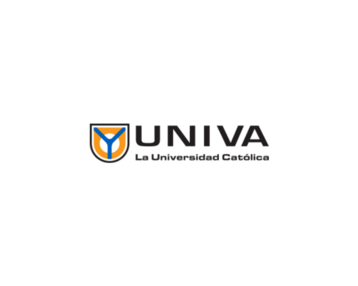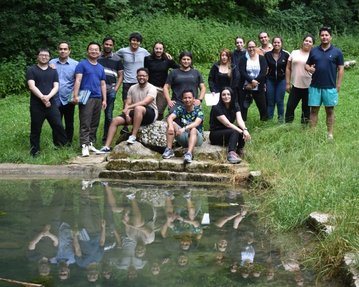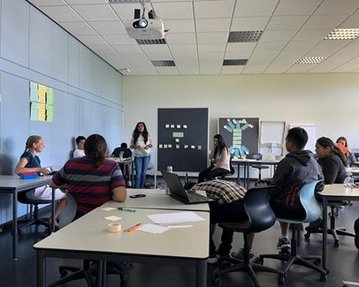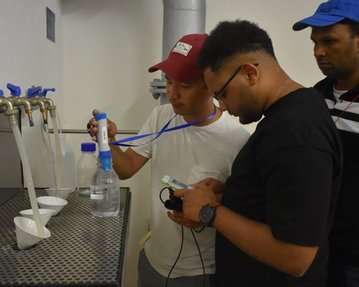
The YIP-2022 (Your Ideas into Practice) is not only about the exchange of ideas, knowledge and solutions to problems, it is also a platform to exchange sociocultural awareness and to grow emotionally. Sonam Tamang is reporting on this two weeks.
The YIP-2022 (Your Ideas into Practice) is not only about the exchange of ideas, knowledge and solutions to problems, it is also a platform to exchange sociocultural awareness and to grow emotionally. Sonam Tamang is reporting on this two weeks.
A number of our international students participated in this programme, which was held from 13 to 25 June 2022. The programme was initiated by Professor Dr Ulrike Gayh, Study Programme Director of Water Technology at SRH University Heidelberg in association with the Universidad del Valle de Atemajac (UNIVA) from Mexico under the supervision and coordination of Professor Dr Livier De Regil. "YIP" is part of the Baden-Württemberg-STIPENDIUM for University Students – BWS plus, a programme of the Baden-Württemberg Stiftung.
The first day of YIP-Aqua 2022 officially commenced with a warm welcome by the President of SRH University Heidelberg and by the Dean of the School of Engineering and Architecture. Afterwards, the International Office guided the participants around the campus and through the water lab, taking a short break for lunch at the Cube.
Later that evening, participants went on a tour of Heidelberg using a mobile app and discovered the city’s water management and architectural highlights. The first day concluded with a visit to a brewery and dinner together at the Kulturbrauerei in Heidelberg’s old town.
The next day, Professor De Regil led a workshop on the water development situation in Mexico and the concept of Frugal Innovation. During the workshop, international participants from countries such as India, Nepal, Mexico and China were divided into three teams to focus on a specific body of water: the Lerma River, Lake Chapala and the Santiago River. The teams identified the sources, causes and consequences of polluted water sources using the problem tree concept. At noon, the participants visited the Pfaffengrund Energy Park and Bahnstadt. Representatives of the Pfaffengrund Energy Park showed the construction details of the park and explained how sustainable energy will be produced and used in the future.
The third day started with a tour of Worms, followed by a visit to the Erlebnisgarten constructed wetland. There they were warmly welcomed by the Mayor of Worms and two young climate activists. The participants were guided through all the areas of the constructed wetland. They measured physical indicators such as pH, conductivity, dissolved oxygen (DO), colour and odour to see what the water quality was like in the different phases. The water samples they collected were taken to the water laboratory of SRH University Heidelberg. In the water lab, other chemical parameters were measured and analysed. Wetland creation is one of the appropriate techniques to treat water from the Lerma River, Lake Chapala and the Santiago River, so it was interesting to see how this could be done.
On the day of Corpus Christi, Professor Gayh guided the participants from UNIVA Mexico to the Teltschik Tower in Wilhemsfeld and spent a sunny day canoeing with them on the Neckar River.
After the weekend, Professor Andreas Gerber, Dean of the Faculty of Engineering and Architecture, gave a lecture on innovation management. After a discussion among the participants, they chose two main problems related to Lake Chapala. The first one was “How to reduce the concentration of heavy metals in Lake Chapala to improve the social, economic, health-related and environmental conditions of the people” and the second one was “How to reduce, reuse and recycle the water for the small farmers around Lake Chapala”. Later, Rolf Stahlhofen of Water is Right appeared as a guest. Stahlhofen has worked in many parts of the world to solve water and sanitation problems. The experiences he shared were truly inspiring and an act of humanity.
From Tuesday to Friday, the annual karst excursion was led by Dr. Thomas Sterr and included visits to facilities such as the Neu-Ulm, the modern wastewater treatment plant, the waste treatment facilities at the ZAK in Ringsheim and the drinking water treatment plant of the Landeswasserversorgung in Langenau. In addition, as always, the phenomena of karst were introduced with the highlight being the Falkenstein cave.
On 24 June, all the participants headed to the Falkenstein Cave to explore an exciting wild cave. In the caverns, the participants learned how the cave was formed, and there was a short lecture on aspects such as karst water, history, clay deposition and sinkholes.
During the excursion, water samples were taken at ten different sites, for example on the Tauber River and at the Danube Sinkhole. Parameters were measured using a multimeter and test strips. The parameters measured included pH, temperature, conductivity, hardness, and concentrations of heavy-metals. The concentrations determined in the water samples collected on site were compliant with the requirements for biodiversity and biological welfare.
On the last day, a meeting was held with the Mexican guest together with Professor Gayh and participants from SRH University Heidelberg. There, the participants discussed the problem and the solution of the two main problems that had been addressed during the field trip. At the end of the event, Professor Gayh gave all the UNIVA visitors an SRH hoodie as a token of friendship.
The YIP-Aqua 2022 created a unique opportunity to work on a common problem, discuss it, and find a suitable solution. Many thanks go to the Baden-Württemberg Stiftung for this wonderful opportunity. Ultimately, the YIP-Aqua project together with SRH University Heidelberg and UNIVA Guadalajara gave the international participants the opportunity to share knowledge, collaborate and create many memories. The participants from SRH University Heidelberg are looking forward to visiting UNIVA Guadalajara and going on a field visit to Lake Chapala to implement the ideas they developed during the workshops.



The project “YIP (Your Ideas to Practice)“ is part of Baden-Württemberg-STIPENDIUM for University Students – BWS plus, a programme of the Baden-Württemberg Stiftung.